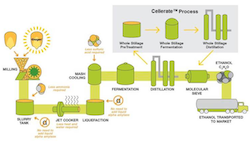The Environmental Protection Agency (EPA) has given D3 Renewable Identification Numbers (RINs) certification to Quad County Corn Processors (QCCP) for its cellulosic ethanol produced with Cellerate  process technology. The technology is a collaboration between Syngenta and Cellulosic Ethanol Technologies, a subsidiary of QCCP. The biorefinery earned D3 pathway approval from the EPA on Oct. 7, 2014 and Quality Assurance Program (QAP) certification on Oct. 10, 2014. Clearing these hurdles led to production of QCCP’s first QAP D3 RINs on Oct. 16, 2014.
process technology. The technology is a collaboration between Syngenta and Cellulosic Ethanol Technologies, a subsidiary of QCCP. The biorefinery earned D3 pathway approval from the EPA on Oct. 7, 2014 and Quality Assurance Program (QAP) certification on Oct. 10, 2014. Clearing these hurdles led to production of QCCP’s first QAP D3 RINs on Oct. 16, 2014.
To qualify as cellulosic biofuel, a renewable fuel must meet a 60 percent threshold (aka reduction) for lifecycle greenhouse gas emissions. RINs are used for compliance with the Renewable Fuel Standard (RFS) program and may be “banked,” traded or sold for use by parties (fuel producers and importers) who must comply with the RFS.
According to QCCP Chief Executive Officer Delayne Johnson, as cellulosic D3 RINs become available on the commercial market, biofuels opponents will no longer be able say there are no D3 RINs as a strategy to weaken the RFS. “The biofuels industry now has the technology available to create two billion gallons of cellulosic ethanol – with no more corn,” said Johnson. “QCCP is proud to be one of the first companies to issue D3 RINs. We look forward to higher D3 RIN requirements in 2015 as new production comes on.”
QCCP expects to produce one million gallons of cellulosic ethanol in 2014 and two million gallons in 2015. Earlier this year.
“Cellerate is designed to increase an ethanol plant’s production by allowing the corn kernel fiber to be converted into cellulosic ethanol,” added Jack Bernens, head of marketing and stakeholder relations for Enogen corn enzyme technology. “Ethanol plants can easily integrate Cellerate process technology into their existing production process. Cellerate, in conjunction with Enogen corn, will deliver notable benefits to ethanol plants beyond what can be achieved through either technology alone.”

